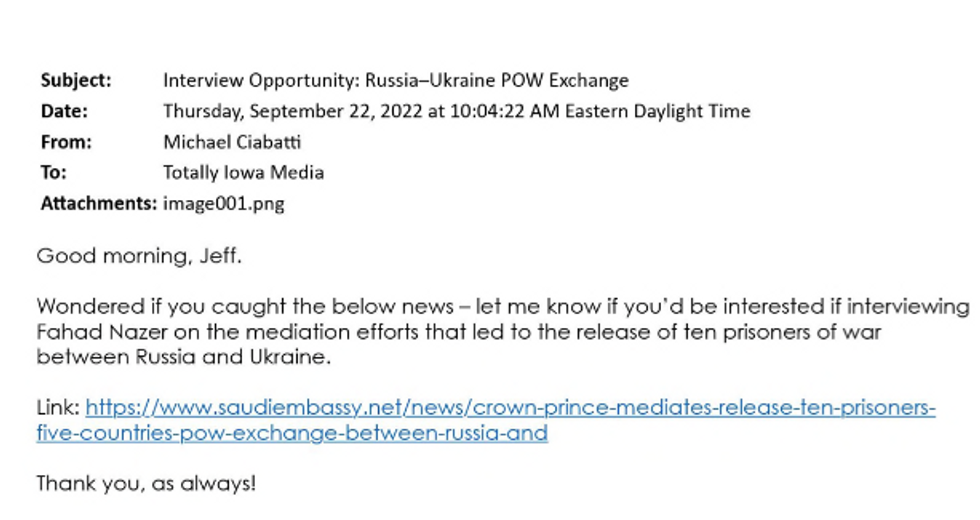Last week, Russia and Ukraine made a surprise announcement that they would exchange nearly 300 prisoners of war — the largest since Moscow’s invasion — including 10 foreign citizens.
Equally surprising was the identity of the apparent arbiter of the deal: Mohamed bin Salman. The Biden Administration welcomed the diplomatic breakthrough, thanking Saudi Arabia and Turkey, which also played a role in the negotiations. Given the Crown Prince’s poor humanitarian track record, some were skeptical about his motivations. “White House thanks killer crown prince after Saudis broker Ukraine POW swap,” read one headline.
Predicting some skepticism, the Saudi foreign minister told the Guardian their role in the mediation was purely for “compassionate reasons.” The foreign minister was quick to dismiss any notion that the move was an attempt to improve its image in the West; “I think that’s a very cynical view.”
Only, the Saudi government’s own actions suggest otherwise.
The same day the prisoner swap was announced, a public relations firm representing the Saudi Embassy sent out dozens of letters to news, radio, and podcast hosts primarily across the Midwest, distributing a statement praising the Crown Prince’s commitment to the “humanitarian issues towards the Russian-Ukrainian crisis.” The letters were sent by public relations firm LS2group, and offered interviews with Fahad Nazer, the spokesperson for the Saudi Embassy. The recipients of the letters included a journalist in Alabama who wrote several stories on the prisoner exchange, a reporter for the Philadelphia Inquirer, and nearly a dozen radio and news hosts across Michigan. Below is the text of a letter, titled “Interview Opportunity-Ukraine POW Exchange,” which was sent to a radio broadcaster in Iowa:
“Good morning, Jeff.
Wondered if you caught the below news - let me know if you’d be interested in interviewing Fahad Nazer on the mediation efforts that led to the release of ten prisoners of war between Russia and Ukraine.
Thank you, as always!”
A TV station in Michigan that received a similar letter took up the offer, inviting Nazer onto the show for a short segment centered around the Saudi role in the negotiations titled “Prisoner release mediated by Saudi Arabia’s Crown Prince.” In most instances, the offer seemingly went unanswered.
These contacts across America’s heartland are cultivated as part of a larger Saudi astroturfing campaign. Someone from LS2group had already met with the Iowa radio broadcaster referenced above to discuss the important economic partnership “between Iowa and the Kingdom” over lunch. Nazer, the Saudi spokesperson, has been a frequent guest on a North Dakota radio station, another recipient of the letter. In their most recent disclosure with the Department of Justice, LS2group reported earning just under $800,000 in six months for their work.
Saudi Arabia has ample reason to want to burnish their international reputation. The killing of Jamal Khashoggi made the Crown Prince a persona non grata. In a rare move, US lawmakers voted to end military support to Saudi Arabia. Earlier this year, Saudi Arabia carried out the largest mass execution in recent years, most of whom belonged to the country’s Shia minority.
Now, the Saudis' attempt to improve their international reputation appears to be working, evidenced by President Biden’s own journey from calling Saudi Arabia a “pariah” to fistbumping the Crown Prince. According to the Saudi Foreign Ministry, several Biden Administration officials, including Middle East advisor Brett McGurk, personally thanked bin Salman for his mediation efforts during a meeting in Jeddah.
When the aunt of one of the freed prisoners found out about the Saudi government’s role in her nephew’s release, she was surprised given the reputation of the Kingdom. She told the Washington Post “I never dreamed that it was a possibility that the Saudi government would be able to do something like this…But any port in a storm.”
In the Kingdom's ongoing efforts to rehabilitate their reputation in the West’s eyes, this is likely the reaction they want every American to have. The prisoner swap should be celebrated, but don’t be fooled into thinking Mohamed bin Salman negotiated it for “compassionate reasons.”

















